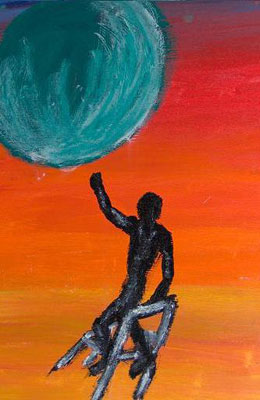All Nonfiction
- Bullying
- Books
- Academic
- Author Interviews
- Celebrity interviews
- College Articles
- College Essays
- Educator of the Year
- Heroes
- Interviews
- Memoir
- Personal Experience
- Sports
- Travel & Culture
All Opinions
- Bullying
- Current Events / Politics
- Discrimination
- Drugs / Alcohol / Smoking
- Entertainment / Celebrities
- Environment
- Love / Relationships
- Movies / Music / TV
- Pop Culture / Trends
- School / College
- Social Issues / Civics
- Spirituality / Religion
- Sports / Hobbies
All Hot Topics
- Bullying
- Community Service
- Environment
- Health
- Letters to the Editor
- Pride & Prejudice
- What Matters
- Back
Summer Guide
- Program Links
- Program Reviews
- Back
College Guide
- College Links
- College Reviews
- College Essays
- College Articles
- Back
Refusing to Tolerate Intolerance
I believe that the only absolute moral truth is that there is none.
Yes, this is a loaded statement, to say the least. In saying this I’m proclaiming that no religion or creed is the right one and that things like killing and stealing are acceptable in certain circumstances. It leaves a bad taste in your mouth, doesn’t it?
And yet I still strongly believe in this statement. In my youth I attended the Unitarian Universalist Society of Iowa City (we’ll shorten it to “the UU”), a church whose focus was accepting others. Members of the UU were a great conglomeration of different people: heterosexuals, homosexuals, Christians, Pagans, Jews and a multitude of other colorful and unique people who may have been uncomfortable or unwelcome in other religious societies. I admired the doctrine of tolerance that the UU espoused, and soon harbored feelings of distaste for the churches that excluded certain people based on trivial or frivolous things.
My conviction that universal tolerance is needed became even stronger when I studied history. Though my AP European History teacher may have made Darth Vader appear comparatively friendly at times, my classmates and I certainly learned a lot in the class. In our detailed study of European history, one thing in particular jumped out at me: the number of wars. These people were fighting constantly! However, what interested me even more were the seemingly endless religious wars that continually tore the continent apart. Here’s why I found them so intriguing:
1.
Both sides of the religious war usually had doctrines that preached love and good will.
2.
Both sides despised each other.
The hypocrisy of it all blew my mind. How could such a paradox exist without people noticing it and pointing it out? After a bit of pondering, the answer came to me. When one group convinces itself that it is the sole possessor of absolute, capital-T Truth, members of the group start to think that they are justified in forcefully converting people to their faith in order to “save” and “enlighten” them so that they may “attain salvation.” If these “heathens” decide to stick true to their “blasphemy,” then they ought to be killed to “cleanse the earth of their evil presence.”
Unfortunately for these groups, developments and discoveries over history have put major dents in their claims of possessing Truth. Revelations like the fact that the sun does NOT revolve around the earth and the emergence of the science-supported theory of evolution have cast an ominous shadow of doubt over the validity of the doctrines of many religions. Additionally, the sheer number of different faiths, each equally convinced that their way is the only way, hints at the possibility that none of these faiths is the “right” one but that each is simply a different way of viewing life.
I should make something clear: this is not an attack on religion; it is an attack on intolerance. I wholeheartedly applaud the moderates who have come to modify their doctrine to make it more reasonable and applicable to the current age, and I recognize that religion can and has united people in love and compelled them to do great things. However, religion has also united people in hatred against another group, and there are still those who insist that certain groups of people are not worthy of rights or salvation due to their personal actions or beliefs, and this is what I desperately hope will someday change.
Reaching absolute Truth is impossible, and false claims that it has been found have caused social rifts and turmoil from ancient history through the present. Only when everybody accepts that there is no Truth can our world begin to become a more inclusive and accepting community. Thus do I fervently pray to no God in particular that someday the quest for Truth will be forgotten and that everybody can love all their neighbors as they love themselves, no matter who their neighbors may be.

Similar Articles
JOIN THE DISCUSSION
This article has 8 comments.
Saying that science supports creationism is fairly absurd, but we could debate about that all day and not get anywhere, and that isn't the point of my article.
While true Christianity does preach love and forgiveness, so many people have ignored/warped that message that it's still definitely worth promoting tolerance for others. You guys can all be hard-core creationists for all I care; everybody has the right to their own beliefs, but that doesn't give anybody the right to judge or condemn others because their beliefs are different.
absolutely!!!
keep writing; you're amazing!
i'm an atheist and i've always been intrigued by these questions.
Check out my article, Society's Attitude Towards Atheism.
